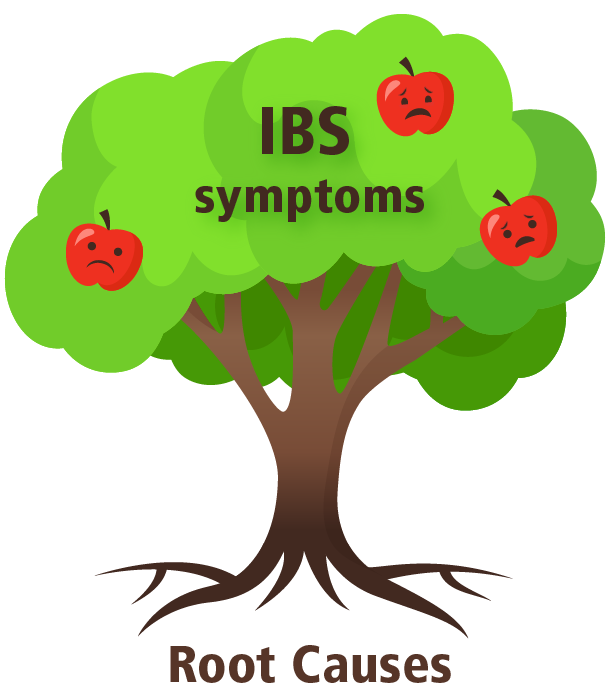Irritable Bowel Syndrome (IBS) is a digestive condition where the function and movement of your bowels are not working quite right. It describes a range of uncomfortable and often debilitating symptoms (ie. bloating, gas, diarrhea, constipation) that may affect people’s daily functioning and quality of life – it can be so severe that they can’t even leave the house! This is a very real problem for 13-20% of Canadians.
IBS should not be confused with “inflammatory bowel diseases (IBD)” like Crohn’s and Ulcerative Colitis, which are more serious bowel disorders.
- Bloating
- Abdominal pain / cramping
- Diarrhea or Constipation
(or alternating between the two!) - Heartburn / gastric reflux
- Weight loss / gain
- Mucous and/or blood in stools
- Excessive gas
- Fatigue
- Insomnia
- Nutrient malabsorption
- Skin problems (ie. eczema, acne, itchy skin)
.
What causes IBS?
IBS is often called a “diagnosis of exclusion,” because it doesn’t fit into any other diagnostic categories of digestive disorders – in other words, it means “I just don’t know what’s wrong with you.”
However, IBS is not a psychosomatic disease (it’s not all in your head!). Emerging research has helped identify some underlying factors that contribute to IBS, including:
- Food allergies & sensitivities
- Dysbiosis (gut bacteria imbalances)
- Poor diet (ie. high sugar, low fibre)
- SIBO (small intestinal bacterial overgrowth)
- Inflammation in the intestines
- Stress
- Bacteria or yeast infection
- Overuse of anti-inflammatory drugs
(ie. Advil, aspirin, steroids)
Conventional treatment usually involves the prescription of sedatives, anti-spasm drugs, antidepressants, or bulk-forming laxatives like Metamucil. While these may offer temporary symptomatic relieve, this approach may not resolve the problem because it doesn’t address the underlying causes of why your digestion is not working.
How do Naturopathic Doctors treat IBS?
IBS and many other digestive conditions can be successfully treated using naturopathic therapies that focus on identifying and removing the underlying causes of the problem, and restoring proper digestive function.
Naturopathic treatments for IBS often include:
- IgG food sensitivity testing
(identify & remove potential food triggers) - Comprehensive Stool Analysis testing
(to assess stool parameters & rule out parasites) - Herbs, homeopathy & nutritional supplements to achieve the goals below
- Dietary & lifestyle interventions
- Reduce gut inflammation
- Repair gut lining integrity
- Feed the healthy gut bacteria
- Correct nutrient deficiencies (ie. zinc, glutamine)
- Treat yeast or bacterial infections
- Rebalance hormones (which are greatly affected by abnormal bacteria)
You don’t have to allow IBS to take over your life!
Naturopathic therapies can deal with the root causes of IBS with dramatic success.
Contact us to find out how we can help!




